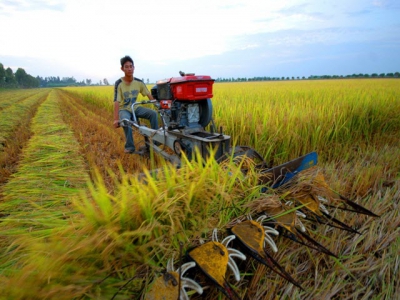Mekong Delta farmers urged to mobilize sci-tech

The application of science and technology (sci-tech) in the Mekong Delta is vital if the region is to promote agricultural restructuring, reach sustainable development and contend with increasing climate change.
As the largest agricultural and fishery center in Vietnam, the Mekong Delta should take the lead in sci-tech application in agricultural development
Advantages
At the 2018 Mekong Delta Agriculture and Fishery Technology Forum on May 25 in the southwestern city of Can Tho, Deputy Minister of Science and Technology Tran Van Tung said sci-tech application is greatly changing agricultural management and production in the Mekong Delta. It has helped reduce input materials and product and labor costs, ensure food safety, minimize negative environmental impacts, and control productivity and quality, Tung said. As the largest agricultural and fishery center in Vietnam, the Mekong Delta should take the lead in applying sci-tech in agricultural development, he added.
Dao Anh Dung, Deputy Chairman of the Can Tho City People’s Committee, said the Mekong Delta accounts for 50, 95, 65, 70, and 60 percent of the country’s paddy rice production, rice output, aquaculture output, fruit production, and fish exports, respectively. The Delta has reached that leading position thanks to its efficient sci-tech application in agriculture, in addition to its favorable natural conditions, Dung said.
A variety of national programs has helped localities and enterprises in the region to apply sci-tech advances. These include key national sci-tech programs, rural development programs, intellectual property development programs, and national programs for improvement of productivity and quality of Vietnamese products, among others. Research institutes and enterprises in the region have created many valuable varieties of plants and livestock breeds and applied advanced technology to develop valuable, competitive products.
Challenges
The Mekong Delta is facing many challenges associated with climate change and sea level rise.
Deputy Minister of Science and Technology Tran Van Tung said the Mekong Delta needs to further promote the application of new and smart technology, automation technology, and IoT (Internet of Things) technology to transform its agricultural production from a traditional system into a modern, cutting-edge network. The Ministry of Science and Technology has committed to concrete actions in support of enhancing the application of smart technology in agricultural production to address challenges faced by the region, Tung said.
Sharing Tung’s point of view, Dao Anh Dung, Deputy Chairman of the Can Tho City People’s Committee, said the perception agricultural development oriented to food security must make way for commodity-oriented, modern and practical agricultural development. The Mekong Delta should promote the application of advanced sci-tech achievements, create climate-smart agricultural models in keeping with the giant leaps offered by the Fourth Industrial Revolution.
Development and improvement of high-tech agriculture promotion policies and policies facilitating connectivity between the state, scientists, businesses and farmers is important to promote agricultural development in the Mekong Delta.
Có thể bạn quan tâm
 5M rice exports to Malaysia up 177%
5M rice exports to Malaysia up 177% $122.4 million worth of rice exports fourth among Top 5 items exported to Malaysia from January to May.
 Agricultural produce and cement see upbeat export in first half
Agricultural produce and cement see upbeat export in first half Besides agricultural produce, the cement sector posted phenomenal export growth in the first half of the year.
 Nearly one-tenth of all agricultural firms set up in past six months
Nearly one-tenth of all agricultural firms set up in past six months As many as 885 agricultural enterprises were established in the first six months of 2018, raising total firms in this sector to 8,667